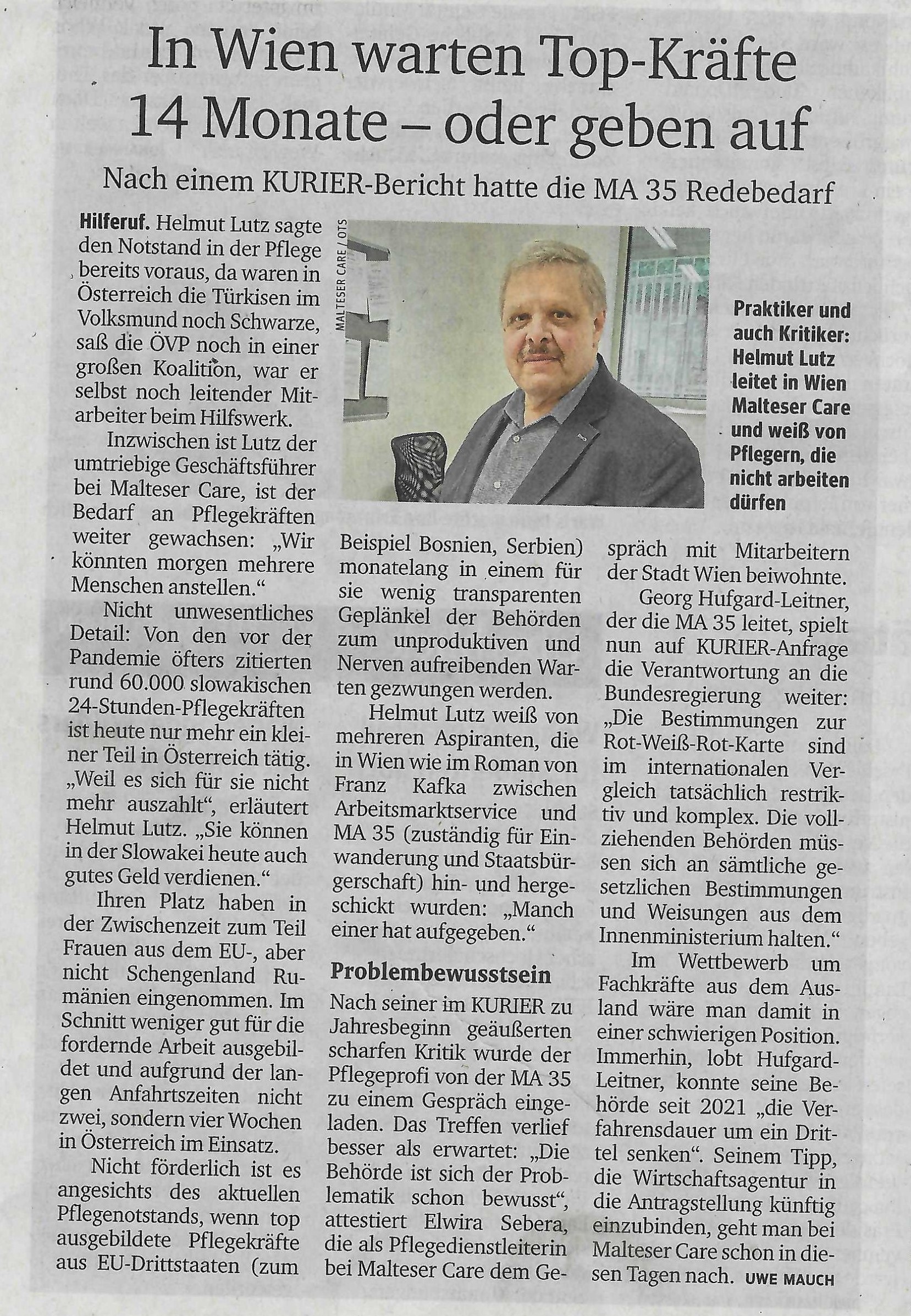
Article from the "Kurier" of 7 February 2024
...in Vienna, top employees wait 14 months - or give up...
This is the statement of a manager in the social sector in Vienna.
The article in the Kurier of 7 February reads like a single indictment of the authorities involved in the licensing of nursing staff in Austria.
There was indeed a time when the MA 35 was heavily criticized when it came to the processing procedures and times for an RWR card. Urgently needed skilled workers in shortage occupations and their employers waited months for authorization. Embassies abroad delayed issuing the necessary entry visas, by some more weeks. Family members could only follow their partner in a later separate application process via the Austrian embassy.
But all that is now history. The Business Immigration Centre in Vienna is now doing an excellent job. The long-awaited red carpet has been greatly streamlined and accelerated by a reform of the law and the processes at the center. It is now a pleasure to communicate with the staff.
The accusations mentioned in the above-mentioned article distort the reality and possibility of labor market admission for nursing staff, nurses and other medical professions.
A "back and forth" between AMS and MA35 cannot happen, as the processes are designed in such a way that all submissions and communication take place via MA35.
If you have done everything correctly in the application process.
In addition, the medical and nursing professions are regulated professions. Authorization to work as a specialist and carer in AT applies to everyone, regardless of nationality, and follows a set procedure:
1. German language skills level B1 are a minimum requirement for all medical nursing professions
2. A positive medical German test is a requirement for nurses
3. Nostrification (recognition of the professional qualification) at the locally responsible institution as a certificate of equivalence is a requirement for EU foreigners, as well.
4. if points 1 to 3 are fulfilled, the applicant must be entered in the medical register.
5. Only then, and only then, will the applicant for the RWR card receive the final authorization as a medical care worker.
The long waiting time therefore has nothing to do with MA 35 or the AMS , but is a process that precedes the application for an RWR card. The process is also very transparent and can be followed at any time.
In order to bridge the time until authorizations as a nursing specialist, the applicant can catch up on any missing knowledge already required in Austria by coming to Austria with a student or pupil visa and completing the knowledge here. During this time, the student may work up to 20 hours per month. However, not yet in their profession.
It is also easier to obtain authorization for this visa if certain requirements are met, such as an existing job offer.
It is not only in the context of the nursing crisis that we in Europe are repeatedly faced with the problem of "missing" training or professional qualifications. For example, chefs in AT are on the so-called shortage occupation list, but it is almost impossible to get chefs into the country who have many years of experience in high-quality restaurant kitchens but have never completed a chef apprenticeship, as is common in AT and is required for the RWR card.
Other EU member states have now adapted their immigration laws in this respect and allow applicants without specialized training to compensate for this with years of experience. See the new German Skilled Labor Immigration Act, adapted by the Aliens Employment Act, which is due to come into force in June this year.
If you want to hire a skilled worker from a non-EU country and are not sure whether your applicant qualifies for an RWR Card or BLUE Card, please contact us. Our team of consultants is there for you on
+43/(0)1-9565919 or +49/(5)473 9592340 or immigration@moves-consulting.com and visit us at www.moves-consulting.com
#skills shortage #nursing crisis #nursing specialist #rwrcard #bluecard #immigration